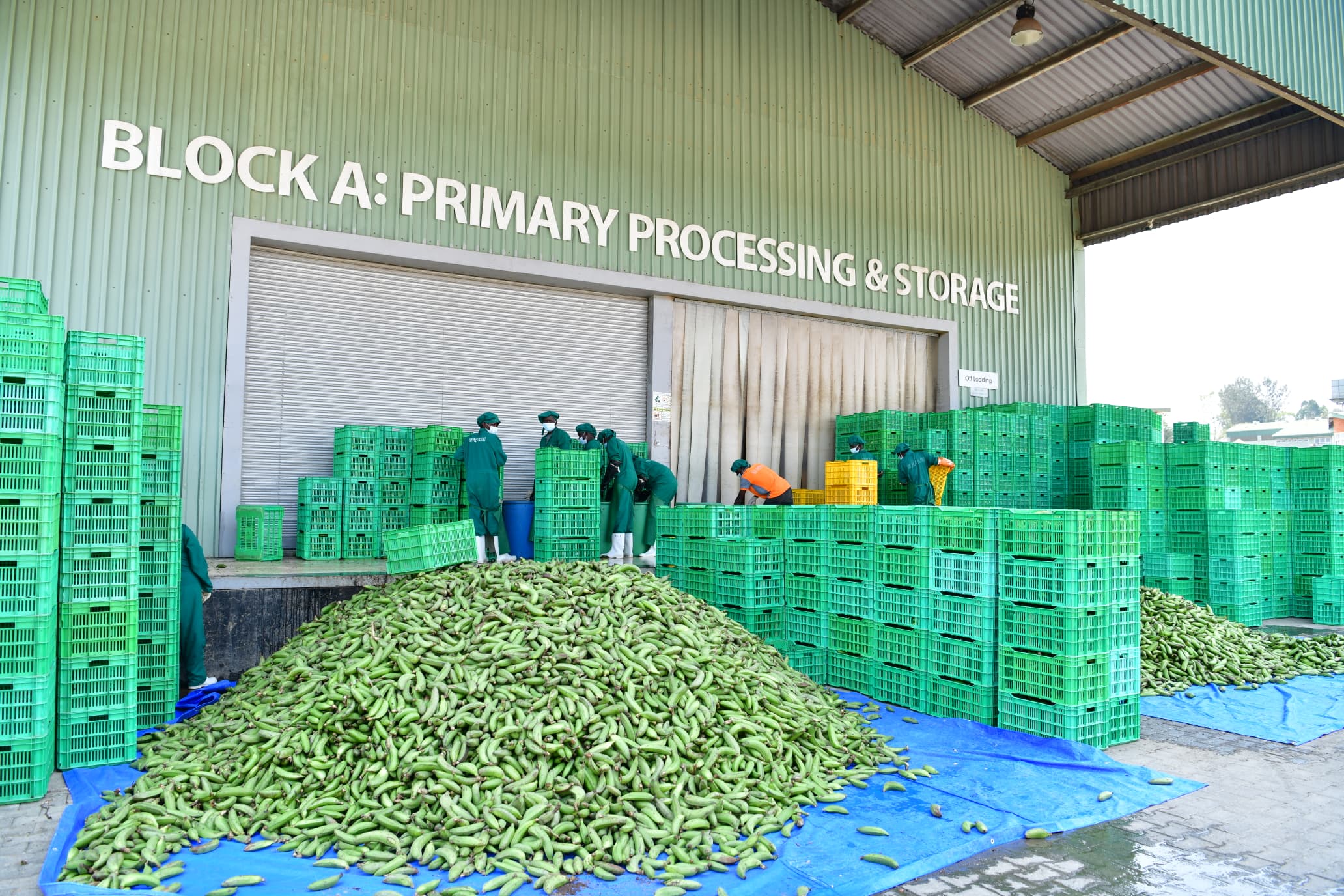By Chris Mugasha
Scientists at the Bushenyi-based banana factory have officially declared Matooke as Uganda’s ‘goldmine’ after completing extensive research. This announcement is the culmination of a 20-year journey since the inception of the Presidential Initiative on Banana Industrial Development (PIBID).
The initiative has led to the approval of various banana products by the International Standards Organization (ISO), enabling them to be traded globally. During a press conference following their annual performance review on Monday, PIBID’s Board Chairman, Dr. Frank Mabirizi, congratulated the scientists for their remarkable achievements in revitalizing the banana industry.

Caption: From-right-Rev.-Prof-Muranga-the-PIBIDs-Director-General-Dr-Frank-Mabirizi-PIBIDs-Board-Chairman-and-Charles-Kiberu-a-Board-member-showing-some-of-the-banana-products-to-the-press-scaled.
“The greatest foundation has been achieved,” Mabirizi stated, commending the efforts of the research team led by Rev. Prof. Florence Isabirye Muranga, the Director General.
He acknowledged their dedication in overcoming numerous challenges to achieve success for the Ugandan government and its citizens.
Mabirizi also expressed gratitude to President Yoweri Museveni for his unwavering support of the initiative since its inception, particularly in prioritizing science and technology, which has significantly transformed the banana industry. “Many thought it was impossible to have banana products on the market, but it has become possible,” he noted.

With increasing pressure to deliver banana products to international markets, PIBID is poised for expansion. Prof. Muranga highlighted that countries such as Japan, various Asian nations, European countries, and states in the U.S., including Chicago and South Africa, have shown interest in importing banana products, particularly starch.
“Matooke has one of the best resistant starches, and international markets are taking notice,” Muranga explained. She added that matooke is gluten-free and its starch aids in gut fermentation while acting as a remedy for cancer and diabetes.
On why farmers have remained stranded with bananas especially during the on-going dry season which is always the peak season despite the existence of the factory, Muranga said the factory’s current capacity cannot absorb all the bananas being produced in the region since its (factory) purpose has been for a pilot study/research. Muranga attributed this issue to the factory’s current capacity, which is limited to processing about 1.4 tonnes daily, insufficient to absorb the regional banana production. “Let farmers bear with us and be patient. Our next phase is to scale up our operations,” she urged.
Plans are underway to increase the factory’s capacity to 10 tonnes daily, with support from the 24 banana farmers’ cooperatives established by PIBID. Muranga also announced that discussions are finalizing for the establishment of warehouses and an industrial technology park in Nshara, Kirihura District, where the government has allocated 450 acres of land for scaling operations.

“I extend our gratitude to President Yoweri Museveni for supporting this initiative through thick and thin,” she added.
Charles Kiberu, the former Chief Administrative Officer of Bushenyi and a board member, emphasized the positive social, economic, and developmental impacts PIBID has facilitated.

A Brief Chronology of Events at PIBID:
– Prof. Muranga conducted a PhD research on Matooke value addition in Germany, funded by Makerere University.
– Upon her return, President Museveni was impressed with the research results and encouraged their application.
– PIBID was established and registered.
– The President ordered funding for further research on banana value addition.
– Research was moved to Nyaruzinga, Bushenyi’s former farm and research institute.
– Bushenyi Local Government provided land for PIBID’s operations.
– Over 20 products from Matooke were developed through the research.
– A commercial factory was established to manufacture these products.
– The market response was overwhelmingly positive, leading to international ventures.
– ISO certification was secured, enabling access to local and foreign markets.
– The government allocated over 450 acres in Kirihura District for a Banana Industrial Park.
With these developments, PIBID aims to solidify Matooke’s status as a key player in Uganda’s agricultural and economic landscape. End





